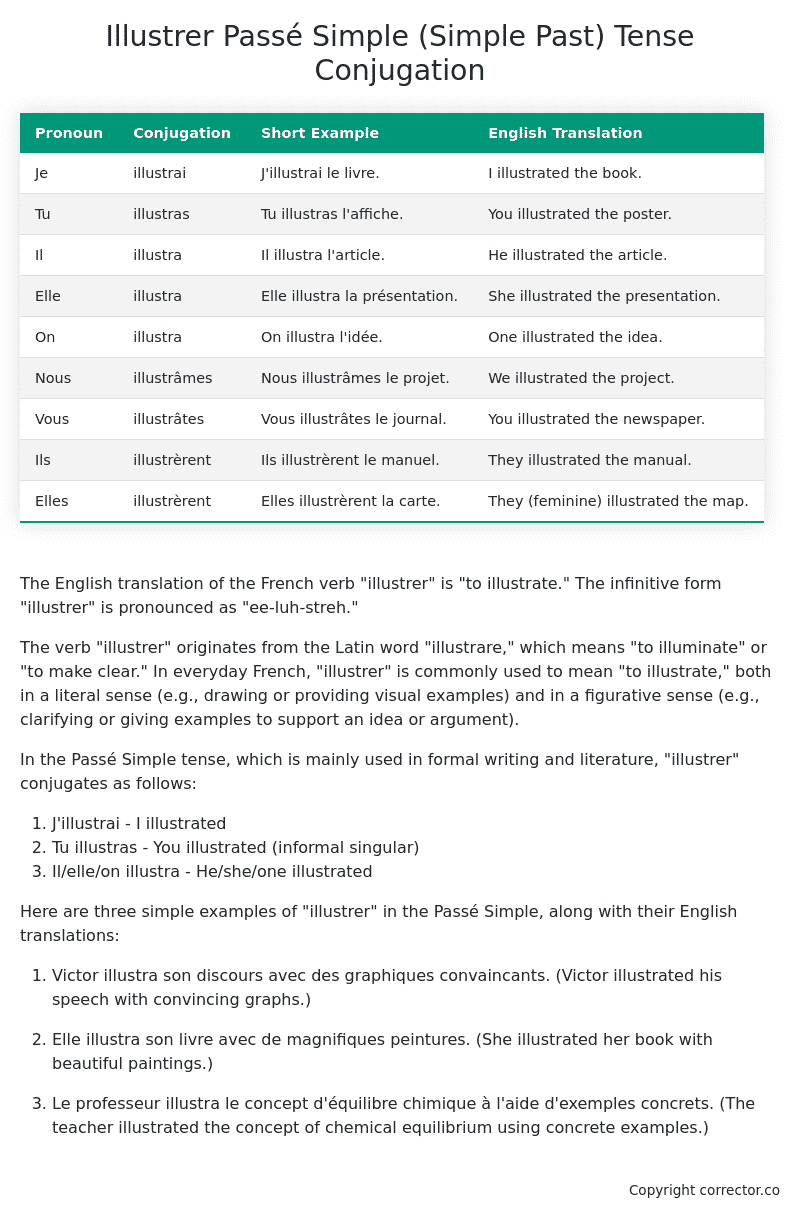Passé Simple (Simple Past) Tense Conjugation of the French Verb illustrer
Introduction to the verb illustrer
The English translation of the French verb “illustrer” is “to illustrate.” The infinitive form “illustrer” is pronounced as “ee-luh-streh.”
The verb “illustrer” originates from the Latin word “illustrare,” which means “to illuminate” or “to make clear.” In everyday French, “illustrer” is commonly used to mean “to illustrate,” both in a literal sense (e.g., drawing or providing visual examples) and in a figurative sense (e.g., clarifying or giving examples to support an idea or argument).
In the Passé Simple tense, which is mainly used in formal writing and literature, “illustrer” conjugates as follows:
- J’illustrai – I illustrated
- Tu illustras – You illustrated (informal singular)
- Il/elle/on illustra – He/she/one illustrated
Here are three simple examples of “illustrer” in the Passé Simple, along with their English translations:
-
Victor illustra son discours avec des graphiques convaincants.
(Victor illustrated his speech with convincing graphs.) -
Elle illustra son livre avec de magnifiques peintures.
(She illustrated her book with beautiful paintings.) -
Le professeur illustra le concept d’équilibre chimique à l’aide d’exemples concrets.
(The teacher illustrated the concept of chemical equilibrium using concrete examples.)
Table of the Passé Simple (Simple Past) Tense Conjugation of illustrer
| Pronoun | Conjugation | Short Example | English Translation |
|---|---|---|---|
| Je | illustrai | J’illustrai le livre. | I illustrated the book. |
| Tu | illustras | Tu illustras l’affiche. | You illustrated the poster. |
| Il | illustra | Il illustra l’article. | He illustrated the article. |
| Elle | illustra | Elle illustra la présentation. | She illustrated the presentation. |
| On | illustra | On illustra l’idée. | One illustrated the idea. |
| Nous | illustrâmes | Nous illustrâmes le projet. | We illustrated the project. |
| Vous | illustrâtes | Vous illustrâtes le journal. | You illustrated the newspaper. |
| Ils | illustrèrent | Ils illustrèrent le manuel. | They illustrated the manual. |
| Elles | illustrèrent | Elles illustrèrent la carte. | They (feminine) illustrated the map. |
Other Conjugations for Illustrer.
Le Present (Present Tense) Conjugation of the French Verb illustrer
Imparfait (Imperfect) Tense Conjugation of the French Verb illustrer
Passé Simple (Simple Past) Tense Conjugation of the French Verb illustrer (You’re reading it right now!)
Passé Composé (Present Perfect) Tense Conjugation of the French Verb illustrer
Futur Simple (Simple Future) Tense Conjugation of the French Verb illustrer
Futur Proche (Near Future) Tense Conjugation of the French Verb illustrer
Plus-que-parfait (Pluperfect) Tense Conjugation of the French Verb illustrer
Passé Antérieur (Past Anterior) Tense Conjugation of the French Verb illustrer
Futur Antérieur (Future Anterior) Tense Conjugation of the French Verb illustrer
Subjonctif Présent (Subjunctive Present) Tense Conjugation of the French Verb illustrer
Subjonctif Passé (Subjunctive Past) Tense Conjugation of the French Verb illustrer
Subjonctif Imparfait (Subjunctive Imperfect) Tense Conjugation of the French Verb illustrer
Subjonctif Plus-que-parfait (Subjunctive Pluperfect) Tense Conjugation of the French Verb illustrer
Conditionnel Présent (Conditional Present) Tense Conjugation of the French Verb illustrer
Conditionnel Passé (Conditional Past) Tense Conjugation of the French Verb illustrer
Conditionnel Passé II (Conditional Past II) Tense Conjugation of the French Verb illustrer
L’impératif Présent (Imperative Present) Tense Conjugation of the French Verb illustrer
L’impératif Passé (Imperative Past) Tense Conjugation of the French Verb illustrer
L’infinitif Présent (Infinitive Present) Tense Conjugation of the French Verb illustrer
L’infinitif Passé (Infinitive Past) Tense Conjugation of the French Verb illustrer
Le Participe Présent (Present Participle) Tense Conjugation of the French Verb illustrer
Le Participe Passé (Past Participle) Tense Conjugation of the French Verb illustrer
Struggling with French verbs or the language in general? Why not use our free French Grammar Checker – no registration required!
Get a FREE Download Study Sheet of this Conjugation 🔥
Simply right click the image below, click “save image” and get your free reference for the illustrer Passé Simple tense conjugation!

Illustrer – About the French Passé Simple (Simple Past) Tense
Formation
Usage
Narration
Historical Context
Interactions with other tenses
Passé Composé
Imparfait
Conditional and Subjunctive
Summary
I hope you enjoyed this article on the verb illustrer. Still in a learning mood? Check out another TOTALLY random French verb conjugation!


